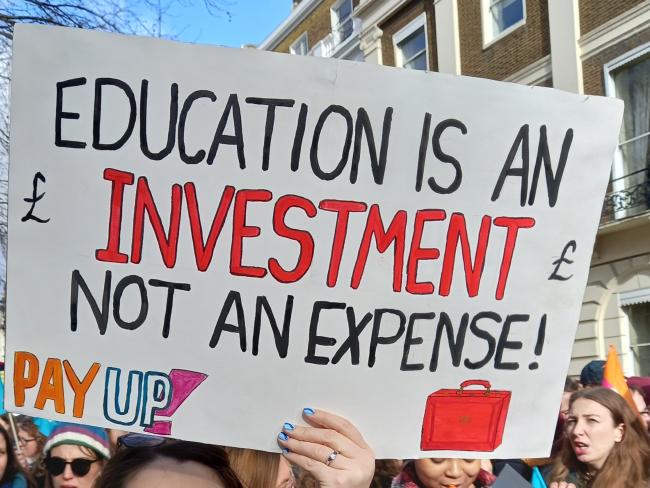
Clear message from teachers on TUC rally, London, 1 February 2023. Photo Workers.
Ever since the crash of 2008 successive governments have relied on a strategy of increasing the money supply through quantitative easing. Unnoticed by many, this has occurred with barely any discernible improvement in British productivity.
In the 25 years or so before the crash productivity grew at an average rate of 2.3 per cent a year. In the 15 years or so since the crash it has been growing at 0.5 per cent per year. Blink and you might not see any growth at all.
Last September the National Institute of Economic and Social Research reported that this slowdown was “unparalleled in the period of the country’s economic history for which we have decent measures” – in other words, since the mid-18th century.
Imbalance
This imbalance between a huge increase in circulating money and credit on the one hand and static productivity on the other is the main cause of the current inflation. We now have a price bubble created by politicians made even worse by sanctions against Russia over Ukraine that are ramping up energy costs.
There are other strands to pull together to help make sense of what is happening in Britain today. For example, the labour time necessary to produce most commodities – such as cars, or computers, or houses – has fallen in the past 25 years. Yet despite technological innovations the rate of profit of British companies has fallen by more than 30 per cent since 1997.
‘For the owners of capital, their version of politics says they must boost their profits – extracted from labour – by using inflationary price hikes as a weapon…’
The class in power, the owners of capital, understand the threat these seemingly contradictory changes pose to its way of life. So their version of politics says they must boost their profits – extracted from labour – by using inflationary price hikes as a weapon to impose all-round real-term wage cuts.
Clearly, demands by workers for a pay rise run counter to this type of political thinking. And just as clearly, these demands have both a political and economic aspect.
Control
Britain’s economy has long-term contradictory trends emerging wholly independent of the will of those who think they run it. In turn this raises the question of control. It’s a question that inevitably acts as a spur for workers to come forward with valuable discussions of their own.
There are no easy answers, no sound bite solutions. But if workers are to take the bull by the horns the challenge is not simply about wages alone: it is inherently political.
Investment
Are the profits generated from labour power to be used as fresh capital for investment in Britain, and if so, how? It’s the only way we can survive and thrive as a country. And here workers must assert their own political legitimacy. The idea of allowing a ruling class to appropriate wealth from labour is worn out. They will blight another generation and waste the talents of the British people.
All this is implicit when British workers say “Enough is enough” – a phrase which in a few words expresses an assertiveness wholly separate from and independent of the will of those who currently run the economy.
Unity
We are one working class. The various struggles for decent wages have sidelined the trumpeters of diversity who seek to split and weaken us. Small wonder that we now see the opponents of working class unity once more shifting their focus back to devolutionary notions which seek to divide the British working class into contending regional tribes.
‘Workers need balanced development where fresh capital generated from labour power is used to develop our economy.’
Society becomes unhinged when like now there is a mismatch between the price and the value of products. What the working class needs is balanced, proportionate development where money and commercial credit are backed by the real value of goods produced in Britain, and where fresh capital generated from labour power is used to develop our economy.
This is the complete opposite to the way Britain’s political economy is currently run. At present once wages are paid, the greater value extracted from labour power goes to private rather than to our collective interests.
With struggle as their teacher, workers are once more establishing themselves as an independent class movement with the potential to pursue their own political economy. To the extent that this is happening, the working class is re-emerging as the decisive weight in the politics of Britain.
